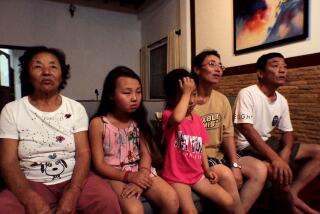GI Pleads Guilty to Deserting
- Share via
CAMP ZAMA, Japan — Nearly 40 years after he vanished across the demilitarized zone into North Korea, Charles Robert Jenkins pleaded guilty in a U.S. military court here today to deserting the Army and aiding the enemy.
In an emotional appearance at this base on the outskirts of Tokyo, the former GI said he abandoned his patrol in January 1965 and slipped into the communist country because he was depressed and feared being sent to Vietnam. He said he wanted to leave the Army and was nervous about participating in dangerous patrols along the DMZ.
“It was Christmastime. It was dark and cold. I started to drink a lot of alcohol,” the 64-year-old Jenkins said, speaking with a deep North Carolina accent. “I wasn’t thinking clearly.... I made a mistake.”
Jenkins said he had assumed that if he went to North Korea, he would be deported to Russia and that from there he could return to his native North Carolina.
“I didn’t think they would keep me,” he said.
Instead, he spent the next four decades in one of the most closed countries on Earth.
“Life in North Korea can be so miserable that you wish you were dead,” said Jenkins, who repeatedly broke into sobs during his testimony.
After crossing the border, he was kept for a while with three other American deserters.
In the early months after his desertion, Jenkins was heard repeatedly over a crackling loudspeaker at the DMZ, urging GIs to rise up against “American imperialism.”
Despite that, the government dropped charges of soliciting other soldiers to desert and of making disloyal statements in return for Jenkins’ guilty pleas. In addition to confessing he had deserted, Jenkins admitted that he had taught English at a military university between 1981 and 1985.
Although desertion during wartime can be punishable by death, Jenkins’ guilty pleas may enable him to avoid prison. The proceedings recessed after Jenkins entered his pleas; a sentence was expected later in the day. The Japanese government has urged leniency for Jenkins so that he can live here with his wife, Hitomi Soga, a Japanese citizen who was abducted by North Korean agents in 1978 and released two years ago. The couple has two daughters.
But forgiveness may not be so simple. More than 50 years after the Korean War ended without a formal peace treaty, North Korea and the United States remain enemies. Washington accuses the communist regime of sponsoring terrorism and deems it part of an “axis of evil” and a nuclear threat.
“Desertion is a very serious crime, especially in wartime. He was working for the North Koreans, who are not very nice people, as we all know.... Jenkins ought to be in jail for the rest of his life,” said Darrell E. Best, a retired lieutenant colonel who was Jenkins’ commanding officer in South Korea at the time of his alleged desertion.
Others have argued that Jenkins has suffered enough by spending most of his life in one of the world’s most impoverished and oppressive countries.
“He has done his tour in hell already,” said Brendon Carr, a former military intelligence official who practices law in Seoul. “His daily punishment the last 40 years must have been waking up and realizing what a fool he had been to defect to North Korea.”
Jenkins was one of seven children from an impoverished family in Rich Square, N.C., population 1,000. He dropped out of school after eighth grade and lied about his age to join the National Guard at 15. He later switched to the Army. Until his desertion, he was said to be a loyal enlisted man -- he was a sergeant and even had “U.S. Army” tattooed on one arm. Until his testimony today, the reason for Jenkins’ desertion had been shrouded in mystery.
Jenkins told the judge, Col. Denise Vowell, that the idea to desert came to him about 10 days before he left. In preparation, he gave friends some of his prized possessions, including silver buttons he had bought in Germany, and bought himself a compass and a white T-shirt. The night before, he drank 10 cans of beer.
“I was not intoxicated, but I was not completely sober either,” he said.
Out in the DMZ in the predawn hours of Jan. 5, 1965, he told the men in his patrol to wait close to the ground, in ambush position. Then he walked north, using his new compass. He dumped the ammunition from his M-16 and tied the white T-shirt to the muzzle.
Stepping carefully through a minefield, he saw a North Korean soldier on the other side of a barbed-wire fence.
“The wind was blowing so hard that the soldier had turned to face north,” Jenkins said. “He didn’t see me. I hollered. He pushed an alarm. In a matter of minutes, soldiers opened the gate and I was taken into custody.”
For a while, he was held with three other American deserters, including one named James Dresnok. Weeping heavily, Jenkins said the three were given so little food that a famished Dresnok once beat him up to steal his portion.
“I can understand why,” Jenkins said, adding that he had forgiven Dresnok.
Jenkins offered few other details on his early life in North Korea, but said that by 1980 he had moved to the Pyongyang area. He met Soga when she was brought to his apartment to be taught English. They married 38 days later.
“The marriage to my wife brought me happiness that I had not known in years,” Jenkins said. “We were allowed to move into a house with running water and electricity.”
Although the power frequently went off, and the pipes froze, they “usually had enough food to eat,” he said.
Jenkins said he agreed to teach English at the military university because he feared that if he refused, he would be sent along with his wife and their daughters to a remote location with little food, electricity or running water.
“One thing I learned, if you refuse in North Korea, you’re wasting your time,” he said. “In the end, you are going to do it.”
Jenkins was released from North Korea in July under an agreement negotiated by North Korean leader Kim Jong Il and Japanese Prime Minister Junichiro Koizumi. Jenkins turned himself in to U.S. military authorities in Japan in September.
He has since been back in a U.S. military uniform, working in a filing room at a salary of about $3,300 a month and living at Camp Zama on the outskirts of Tokyo. But he has been confined to the base pending the outcome of the court-martial.
In court, the uniformed Jenkins at times appeared befuddled, putting his reading glasses on and taking them off, and turning to his court-appointed attorney, James Culp, for an explanation of the proceedings. His wife and their grown daughters sat behind him, looking at the floor most of the time.
Relatives in North Carolina say they expect that Jenkins, if released, will want to continue living in Japan with his wife and daughters. The relatives are hoping, however, that he will return stateside to at least visit his 92-year-old mother, who is in a nursing home.
More to Read
Sign up for Essential California
The most important California stories and recommendations in your inbox every morning.
You may occasionally receive promotional content from the Los Angeles Times.










